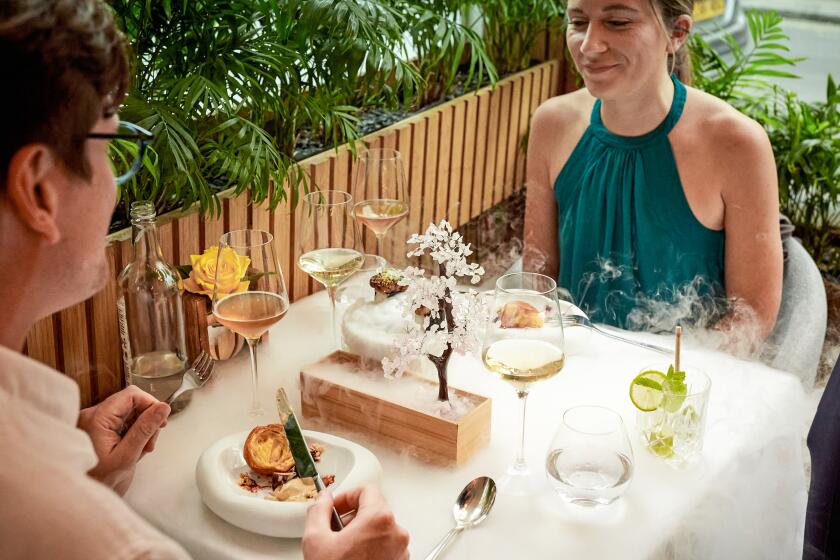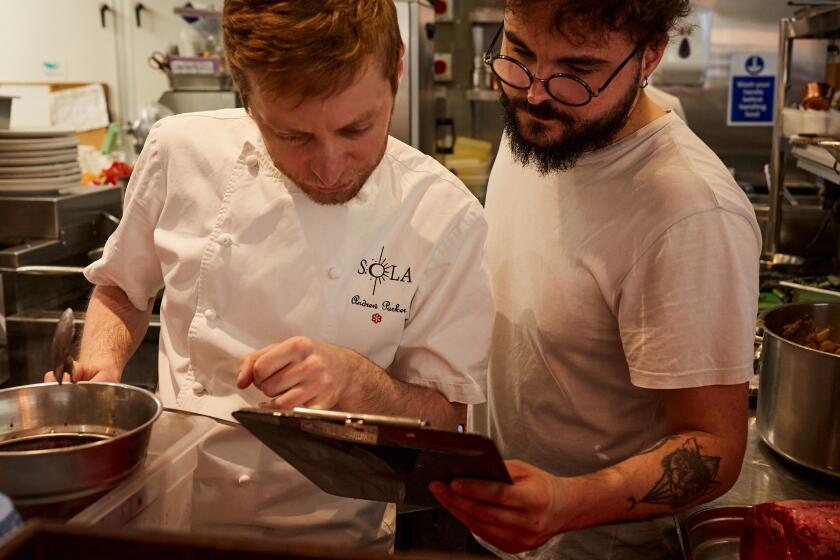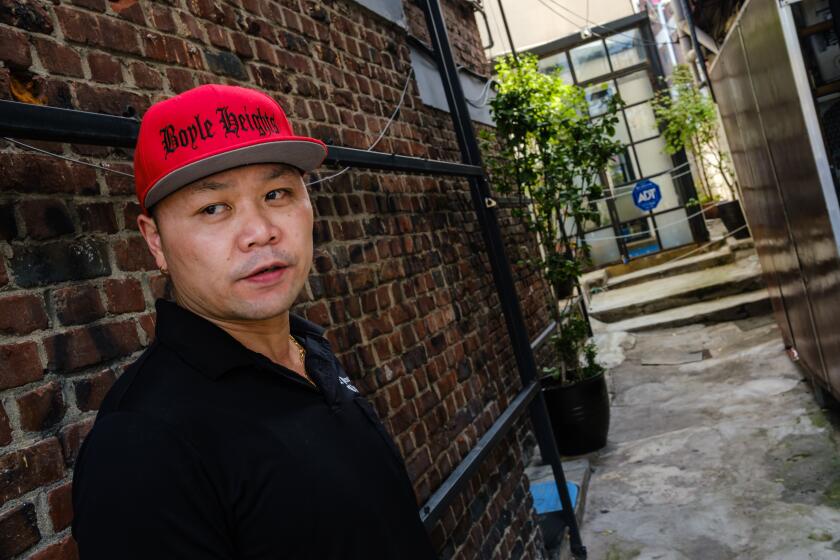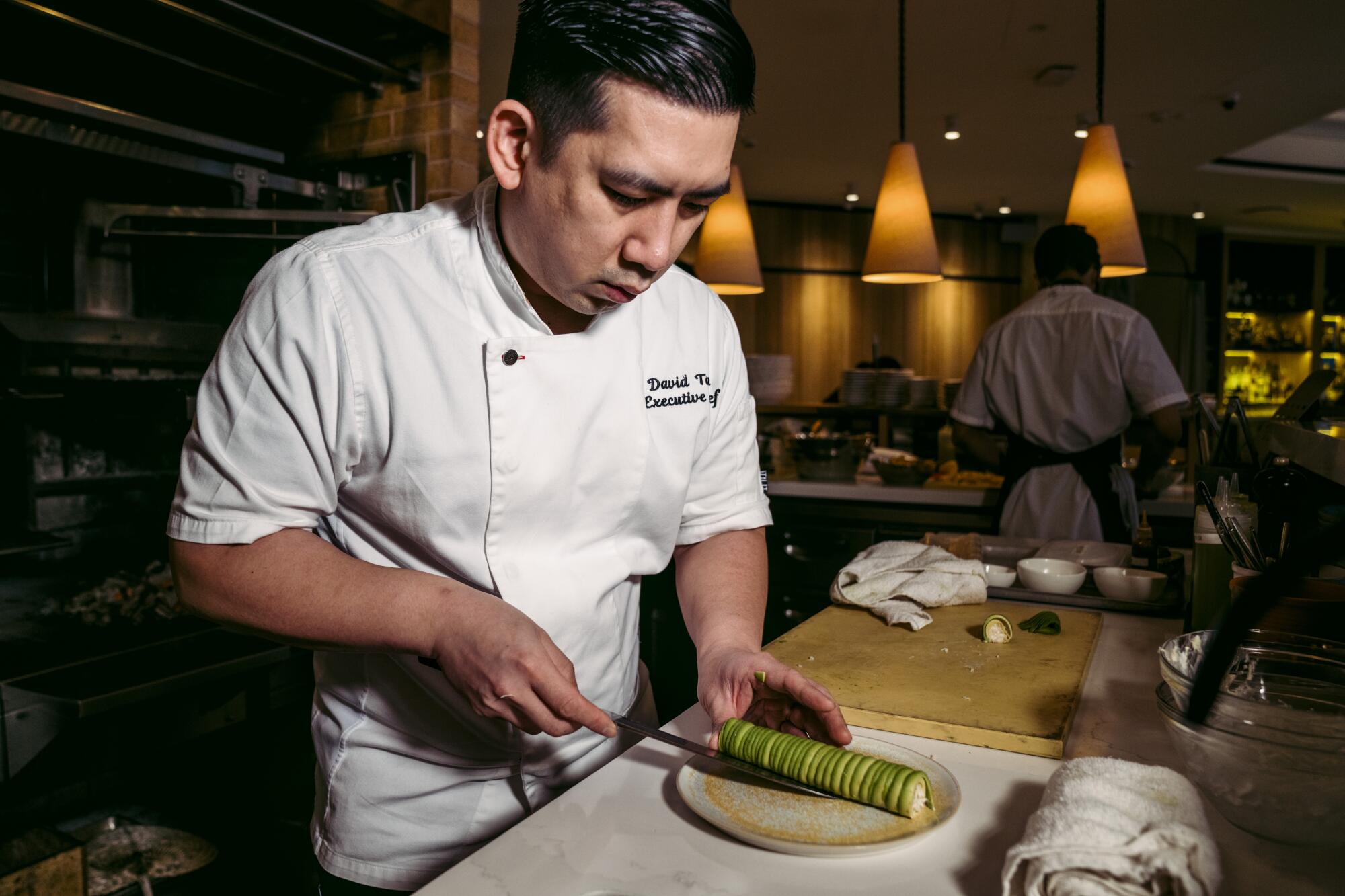
- Share via
SINGAPORE — It’s a Saturday night in the central business district and Rosemead is buzzing to the beat of early-’80s R&B and chatty diners who have ditched ties and banker suits for T-shirts and designer sneakers.
A wood-fire hearth the size of a walk-in closet glows in an open kitchen churning out California-inspired plates of hand dive scallop, crab and avocado tartine. The air is laced with the scent of charred cherry tomatoes — trucked in from a nearby farm in Malaysia — speckled with bits of pork crackling. The tables are a-clatter and the mood is wonderfully chill.
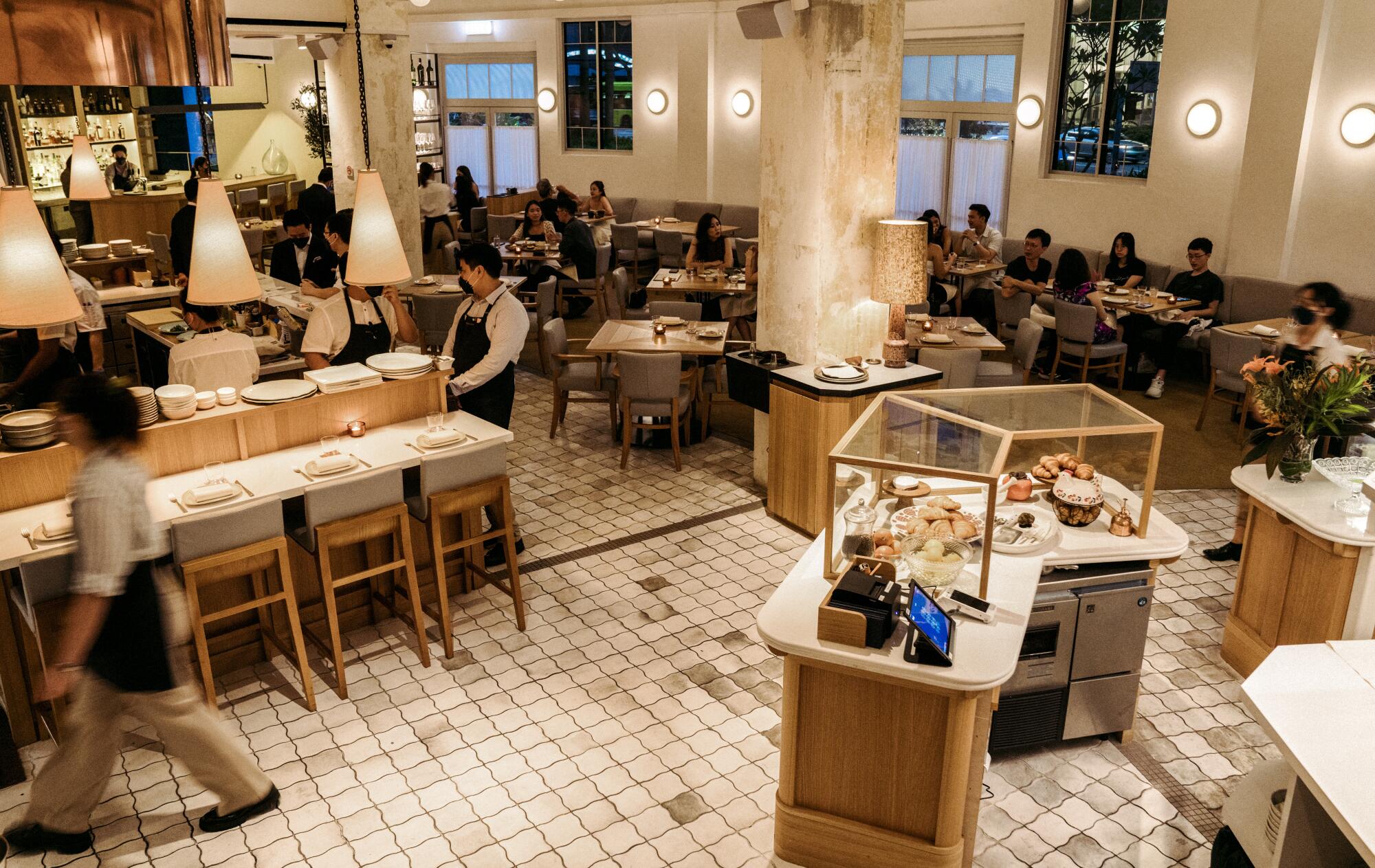
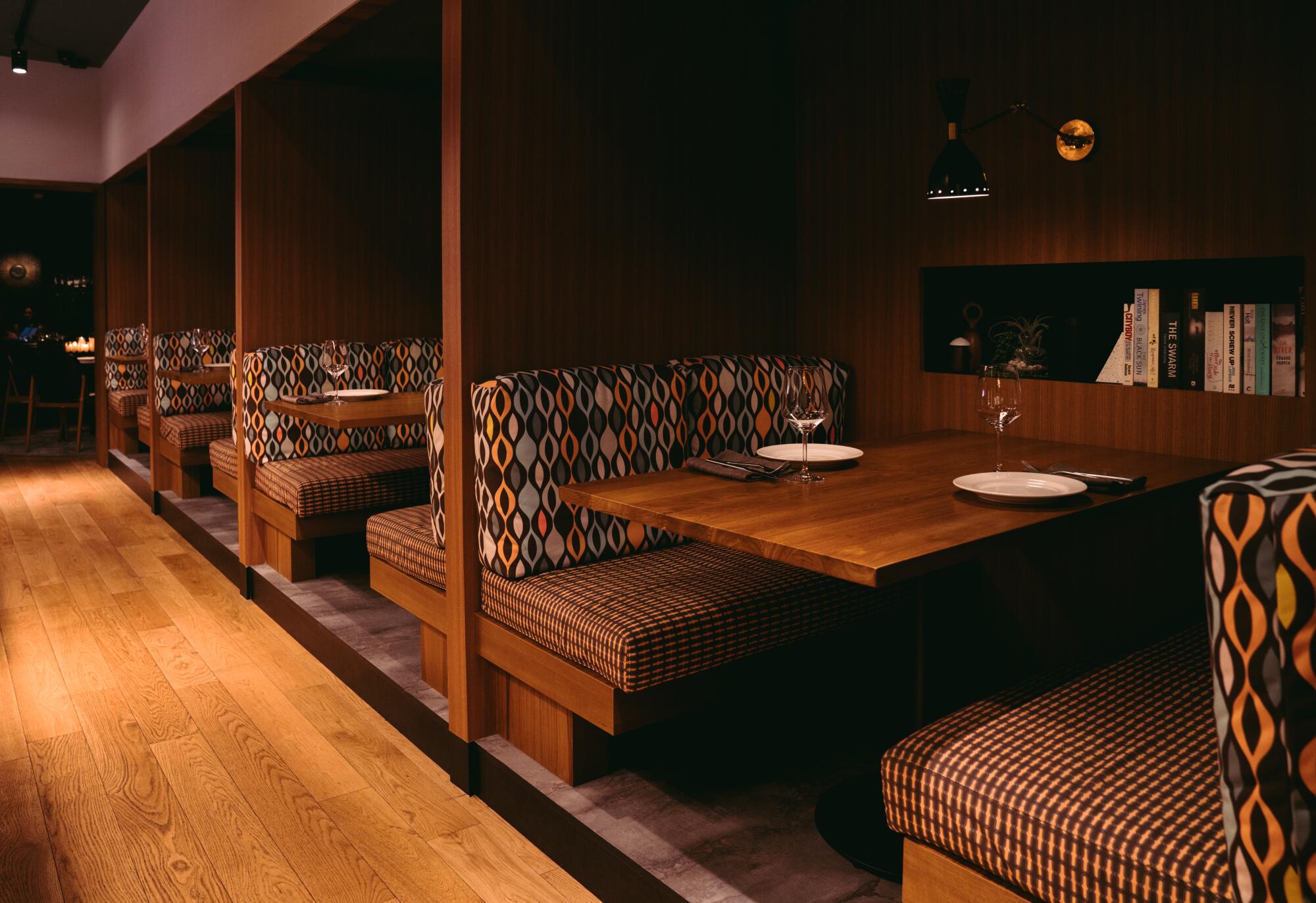
A similar vibe resonates less than half a mile away at another new restaurant celebrating the Golden State. The packed house at California Republic is downing cocktails with names that evoke strains of weed, such as “Lemon Haze” and “Dankelicious.” The menu is described as “SoCal Italian” modified with local produce (who knew jackfruit could pass for Central Coast artichoke?).
In a country brimming with intoxicating cuisine — few things better than the local chicken rice, roti prata and crab beehoon — California’s fuss-free style of fine dining is having an unlikely culinary moment in a city where top dollar is usually reserved for the ambiance and decors of more stuffy European and Japanese restaurants.
Rosemead and California Republic are joined by Osteria Mozza, chef Nancy Silverton’s Melrose Avenue institution, which reopened its outpost in the Southeast Asian city-state last month after closing abruptly in 2018 following co-owner Mario Batali’s embroilment in the #MeToo scandal. Sonoma County’s SingleThread, one of only six three-Michelin-star restaurants in California, will open a monthlong pop-up here in July.
California cuisine is having a moment across the Atlantic, where every month brings a new restaurant, chef or menu imported from Los Angeles or San Francisco.
Grand Central Market’s own Eggslut and Mr. Holmes Bakehouse of San Francisco origin have also opened in Singapore in the last year — the former drawing long lines outdoors despite the sweltering heat, and the latter flashing puns about marijuana in a nation that punishes traffickers with the death penalty.
“I got baked in Singapore,” declares a pink neon sign outside the bakery famed for its “cruffins.”
Their arrival on the country’s fickle food scene, where diners are known to descend on a new hotspot for weeks and then disappear once they’ve posted their meals on Instagram or TikTok, highlights the changing nature and palates of one of Asia’s top restaurant destinations and the long reach of America’s most culturally dynamic state.
Whether it’s the Universal Studios theme park, the Asia-Pacific headquarters of Facebook and Google or the billions in trade, California’s influence is indelible in this country of 5.5 million. Layered into this fascination for things Californian is a game of redefining cultural expectations and moving beyond stereotypes around Hollywood, health food and tech billionaires.
“There is a lot of room to grow in the understanding and appreciation of the culture,” said Indra Kantono, Rosemead’s owner.
Perhaps the surest way to comprehend another land is to taste its dishes. But the chefs here face a quixotic challenge in creating the California experience — not the least because the state’s emphasis on locally grown and full-flavored produce is undermined by the fact that Singapore is too small to support its own agriculture. More than 90% of the food consumed in this island nation roughly the size of the San Fernando Valley is imported from more than 170 countries.
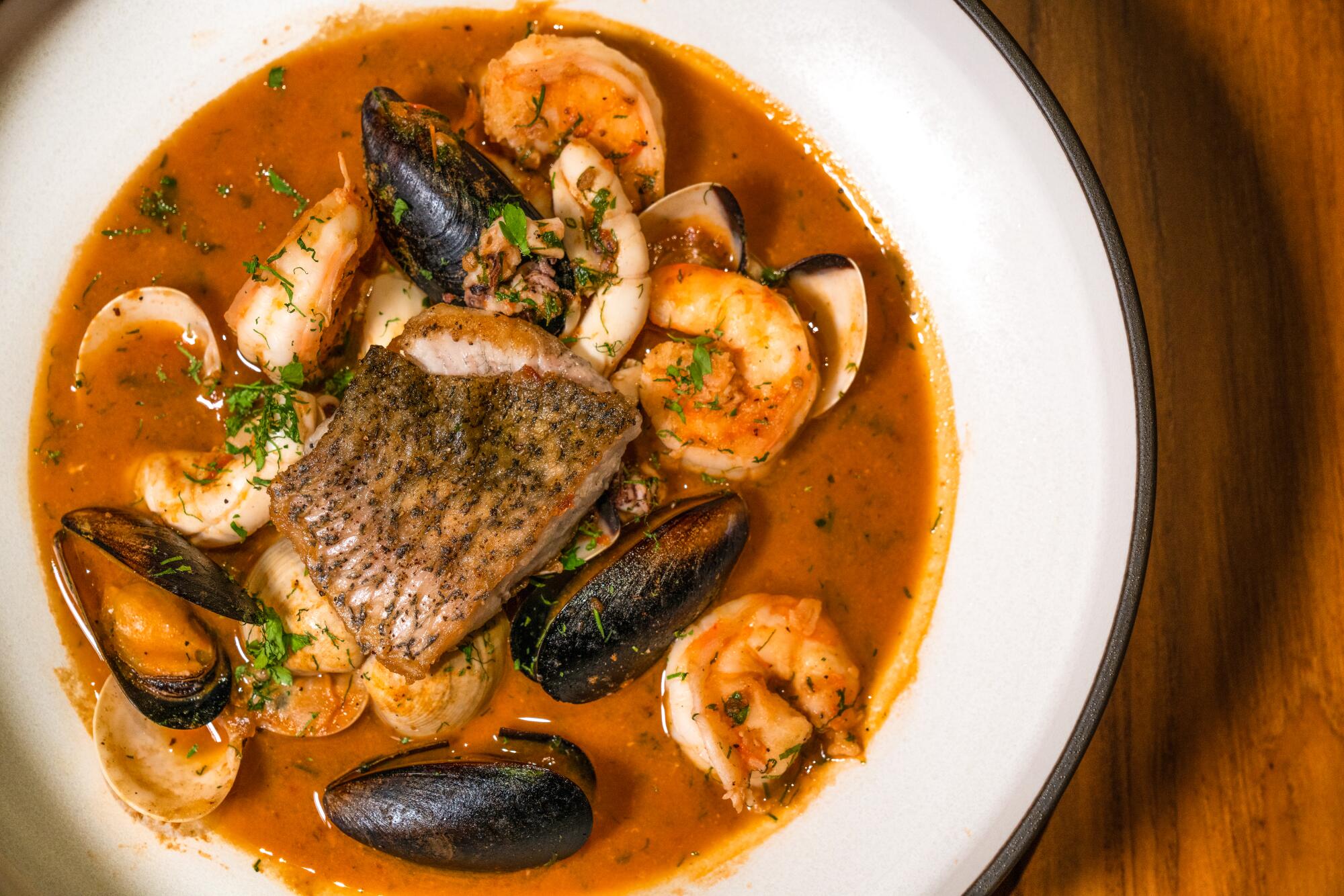
Chefs reflect on what it means to bring California into restaurants across the Atlantic.
“We have to work three times harder because we don’t have the produce California has,” said Michael Goodman, co-founder of the Dandy Collection, the restaurant group that owns California Republic. “We have to scour the region to find a farmer here and a farmer there.”
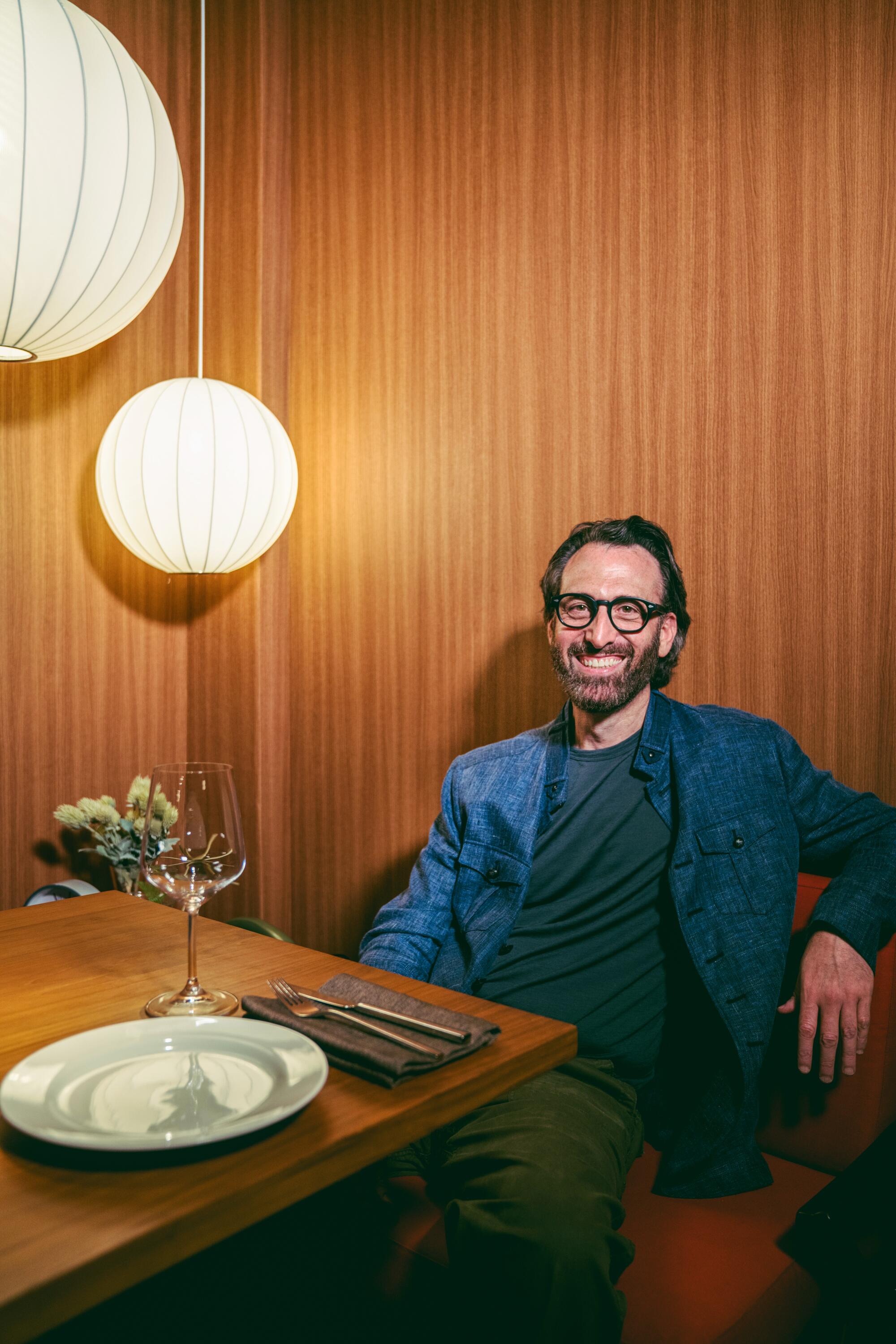
The former professional cook turned interior designer remembers working with legendary Central Coast chef Cal Stamenov in the late 1990s and buying spot prawns directly off a boat, something that’s virtually impossible to do in Singapore, where the warm waters can dull flavors or promote bacteria in shellfish. There’s a reason fried oyster omelets are a signature dish here and not raw oysters on the half shell.
Goodman, whose inspiration for California Republic came from his late father in Daly City, sources fruits and vegetables from neighboring Malaysia. A mountain plateau called the Cameron Highlands, which is as far away from Singapore as Los Angeles is from the farms in Salinas, is one of the only places in the region with cool enough weather to properly grow vegetables like tomatoes, fennel, cauliflower and heirloom beans.
“Sure we dream of having something like the Santa Barbara farmers market or the San Luis Obispo farmers market, but we don’t want to give up and say we can’t have the food we’re really passionate about,” said Goodman, 50, a New York native whose family moved to California three decades ago. “We just have to think about food differently.”
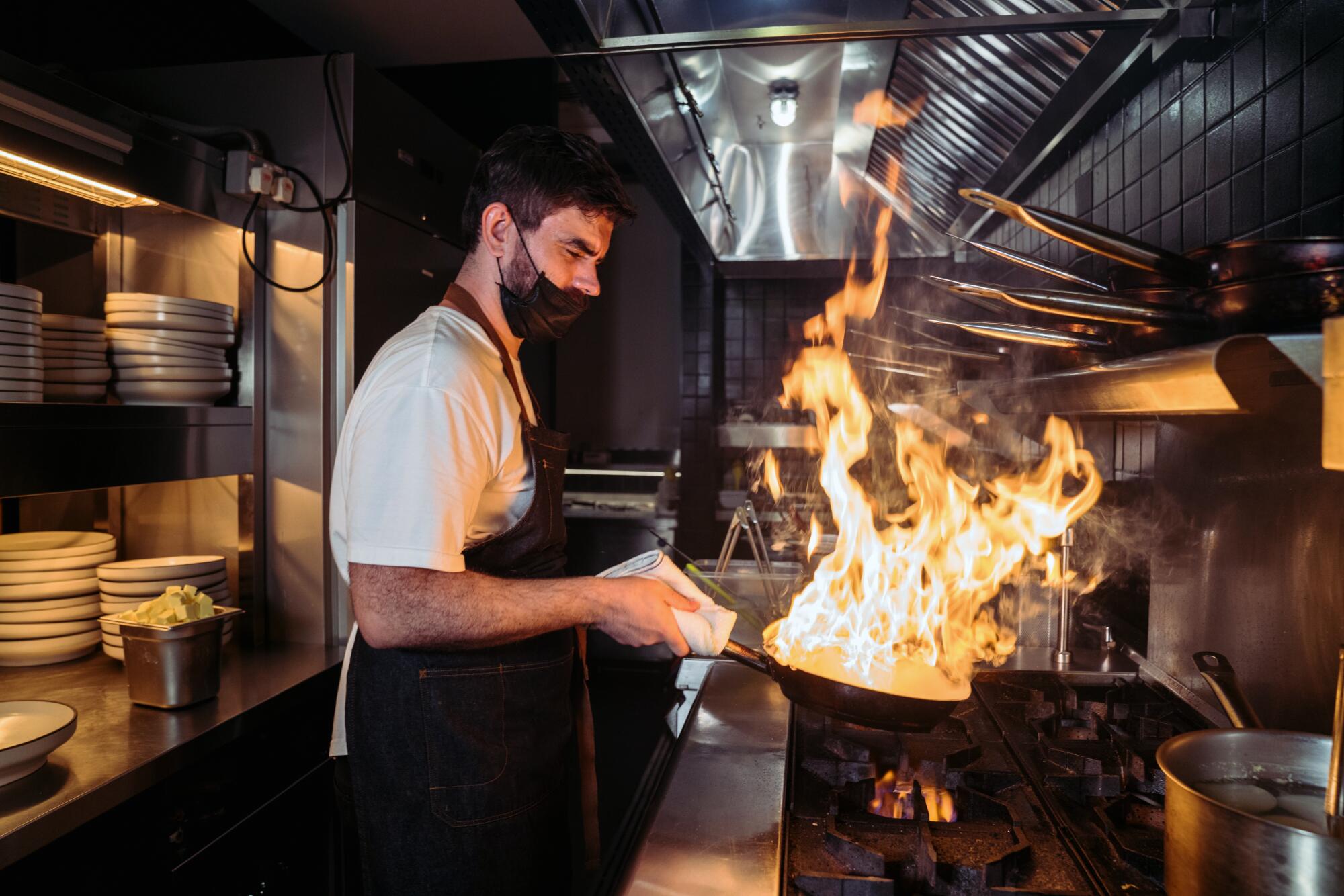
That much was apparent during a recent Zoom session at Goodman’s apartment with former Osteria Mozza chef David Almany, who was logging in from L.A. Almany, who worked at the Melrose location of Osteria Mozza and the one in Singapore before it closed, was helping fine-tune California Republic’s menu to make it au courant.
A dish of grilled Central Coast-style artichokes was failing. The imported artichokes were either too stringy or not meaty enough to justify the cost. Goodman remembered what he learned as chef at the Amandari resort in Bali: Jackfruit, a fibrous pale fruit encased in a spiky oval shell that’s ubiquitous in the Southern Hemisphere, made for a worthy substitute for artichoke after a bit of improvisation.
With Almany standing by, Goodman and his two chefs seared slices of young jackfruit that had been prepared à la Barigoule, a braise in white wine, herbs, lemon and aromatics like leek, garlic and onion. They plated the slices and garnished them with aioli, garlic breadcrumbs and fried shallots. The crew dug in with forks and nodded their heads.
“That’s a winner,” Goodman said. “Balinese artichoke.”
***
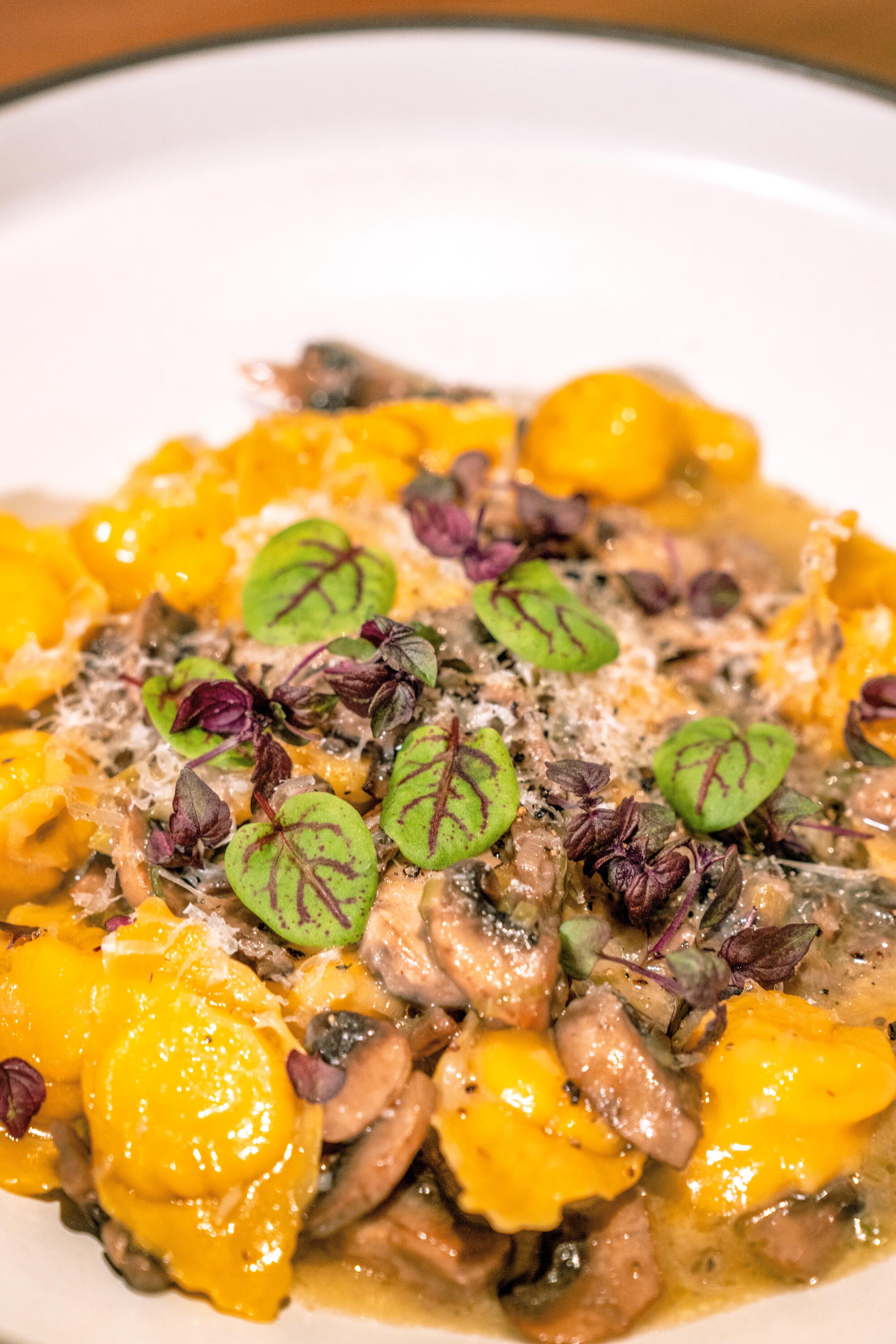
The momentum behind the new wave of California cuisine began at the Marina Bay Sands resort and casino, which looms over Singapore’s skyline like a glass and steel citadel separated from the city by a man-made lagoon. Its three 55-story towers — a hive of bling and ostentation — are connected at the top with a sleek, surfboard-shaped skydeck that houses one of the world’s highest infinity pools.
When it opened in 2010, it demanded restaurants that would impress high rollers and satisfy the government’s mandate to diversify the resort beyond gambling. Its owner, Las Vegas Sands, connected Singapore to the circuit of celebrity chef restaurants proliferating across the world at the time, bringing in names like Batali, Daniel Boulud and Wolfgang Puck.
This story is part of our Global California project
Our correspondents are traveling the globe, sharing stories that examine the complex relationship between the West Coast and the rest of the world.
Almost overnight, Singapore was flush with seasoned chefs and front-of-the-house staff who honed their skills in locales like Beverly Hills, New York, Las Vegas and Miami. It was the first time living overseas for many. They bonded drinking into the early morning, as restaurant staff often do, usually at the go-to watering hole in the lobby of the luxury hotel, a now-shuttered restaurant called Adrift opened by star L.A. chef David Myers.
“It was like being on a cruise ship,” said Michael Pekarsky, a trained sommelier and general manager who started working for Puck at the Hotel Bel-Air and transferred to Spago at the Marina Bay Sands in 2015. “You get stuck up there.”
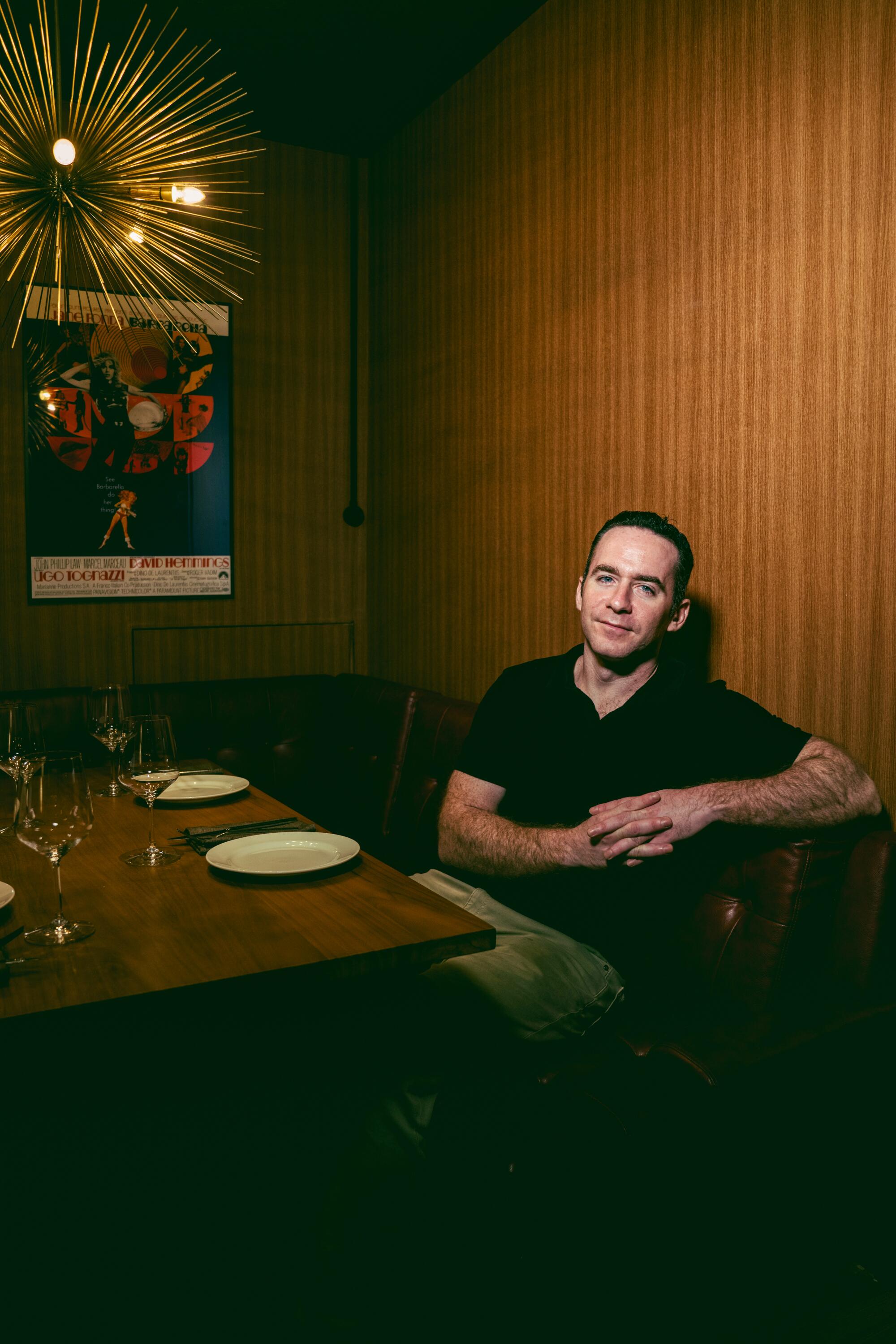
After three years at the rooftop restaurant, the 36-year-old New Jersey native wanted to branch out. He was introduced to Goodman, who was looking for a director of operations at the Dandy Collection. The pair quickly hit it off.
“Two Jewish kids from the East Coast in Singapore. How could we not?” Goodman said.
Pekarsky retired his three-piece suit. He grew out a beard to better fit into the trendy dining group, which also operates Japanese, Indian and Middle Eastern themed restaurants, all meticulously designed to feel just this side of a nightclub, but for grown-ups.
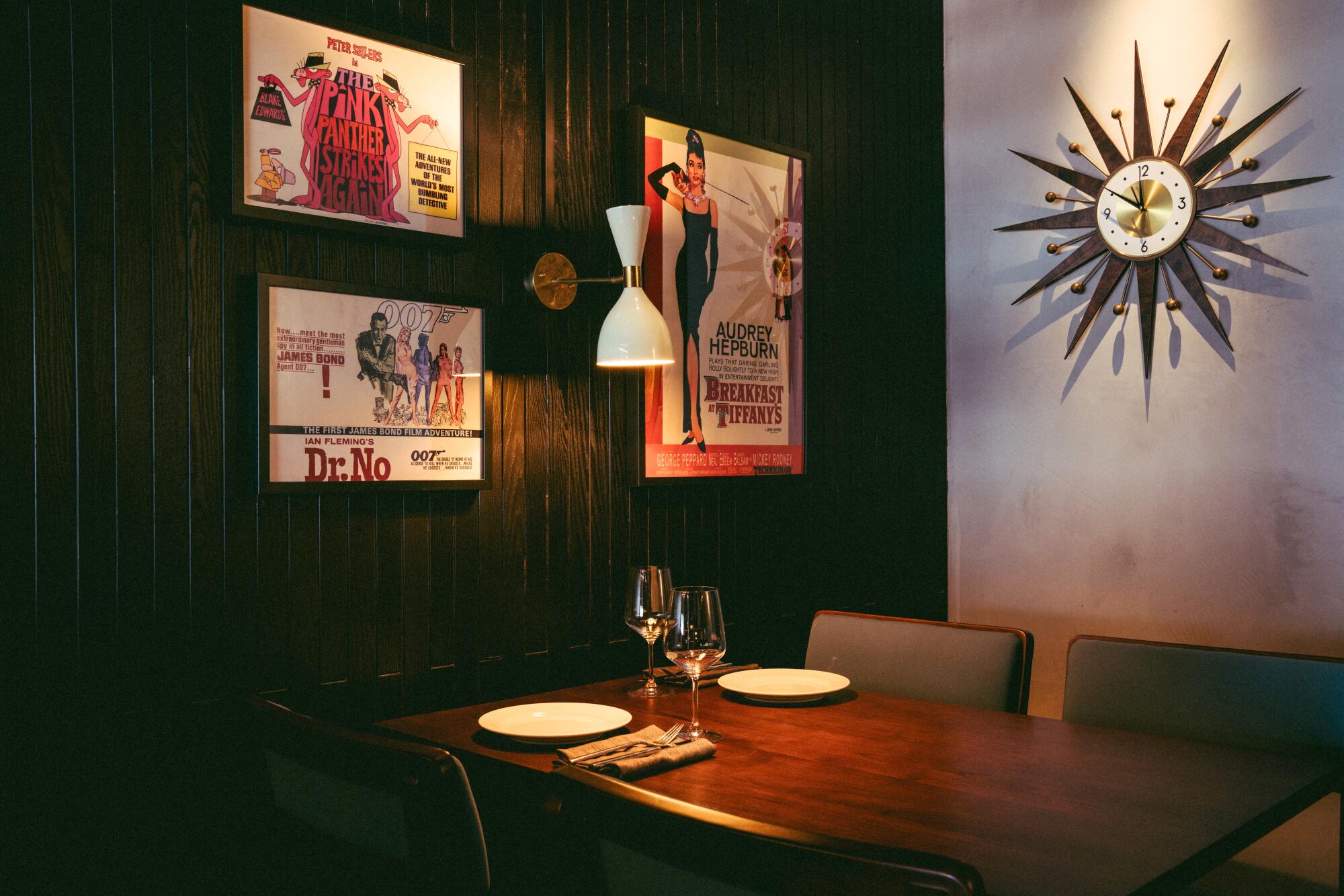
In leaving, Pekarsky joined a band of Wolfgang Puck and Mozza alumni that has planted roots in Singapore, a list that includes Rosemead’s executive chef David Tang and his general manager, James Moon, a La Crescenta native. All three worked together at the Hotel Bel-Air, helping reopen the Spanish Colonial-style property with Puck in 2011.
“It’s like a Marvel movie,” Pekarsky said. “I don’t think there’s any major market where your timelines don’t cross with someone who worked for Puck, Batali or Boulud.”
***
David Tang seemed destined to return to his family’s roots in Asia, even if his odyssey to Singapore was a winding one.
He was the first in his family to be born in the United States. One of his sisters was born in a refugee camp in Hong Kong and his older sister and parents were born in Vietnam. He doesn’t know what year they fled the war-torn country. His parents don’t speak about those days.
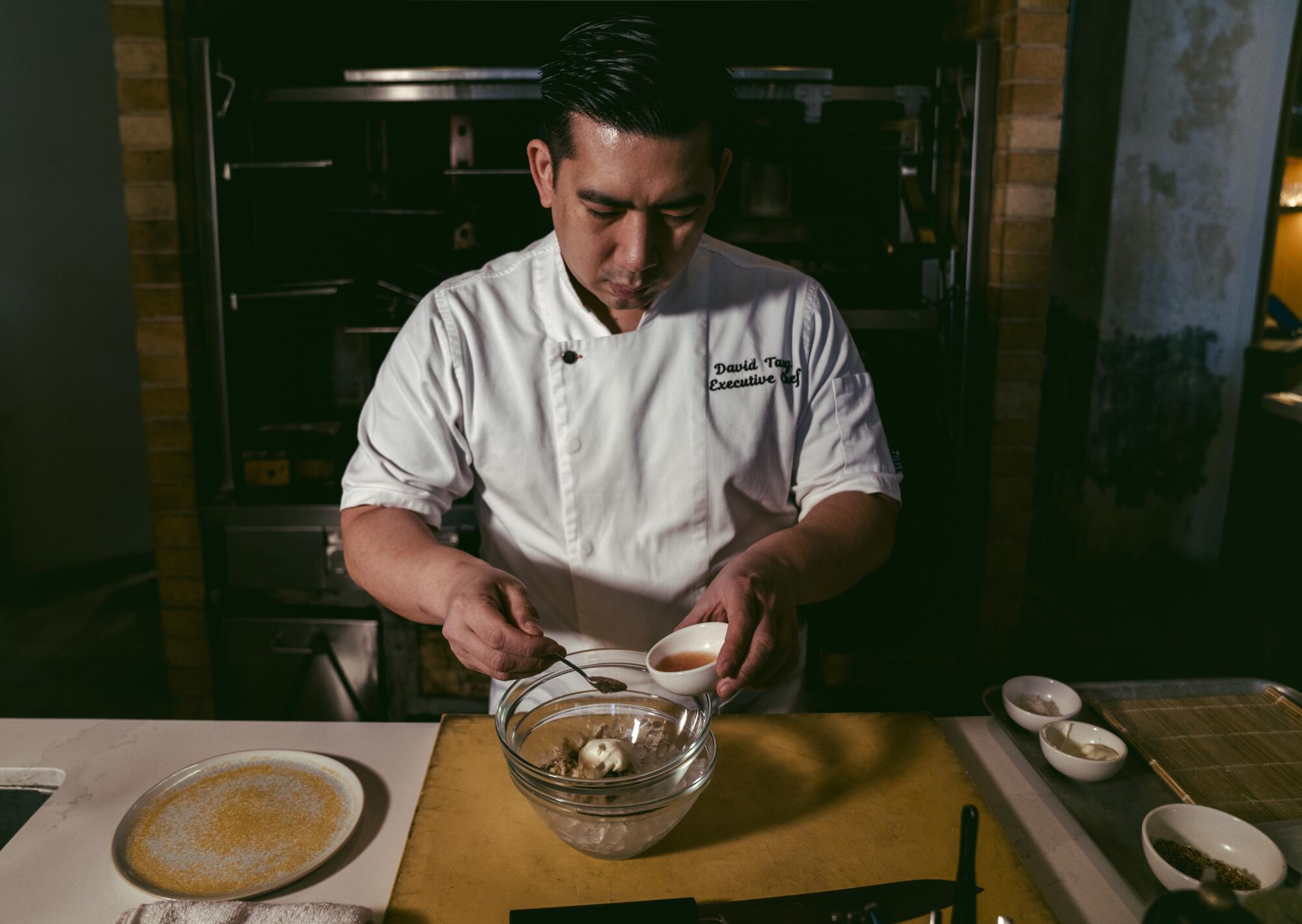
Being ethnic Chinese, the family blended in with the other working-class Chinese immigrants in Rosemead and the rest of the San Gabriel Valley. Tang’s parents worked at a sweatshop making garments. It was up to him to put dinner on the table for everyone by the time he was 12. He learned simple Cantonese dishes — bell peppers stuffed with fish paste, beef and broccoli, steamed fish — from watching the now-defunct local ethnic broadcaster, Channel 18.
But there were concerns other than cooking. Tang was exposed to the violence, drugs and gangs of 1990s L.A. He struggled academically and attended every high school in the Alhambra Unified School District before graduating: “Same story as everybody else,” said Tang. “Parents aren’t home a lot, so you kind of run around, make trouble.”
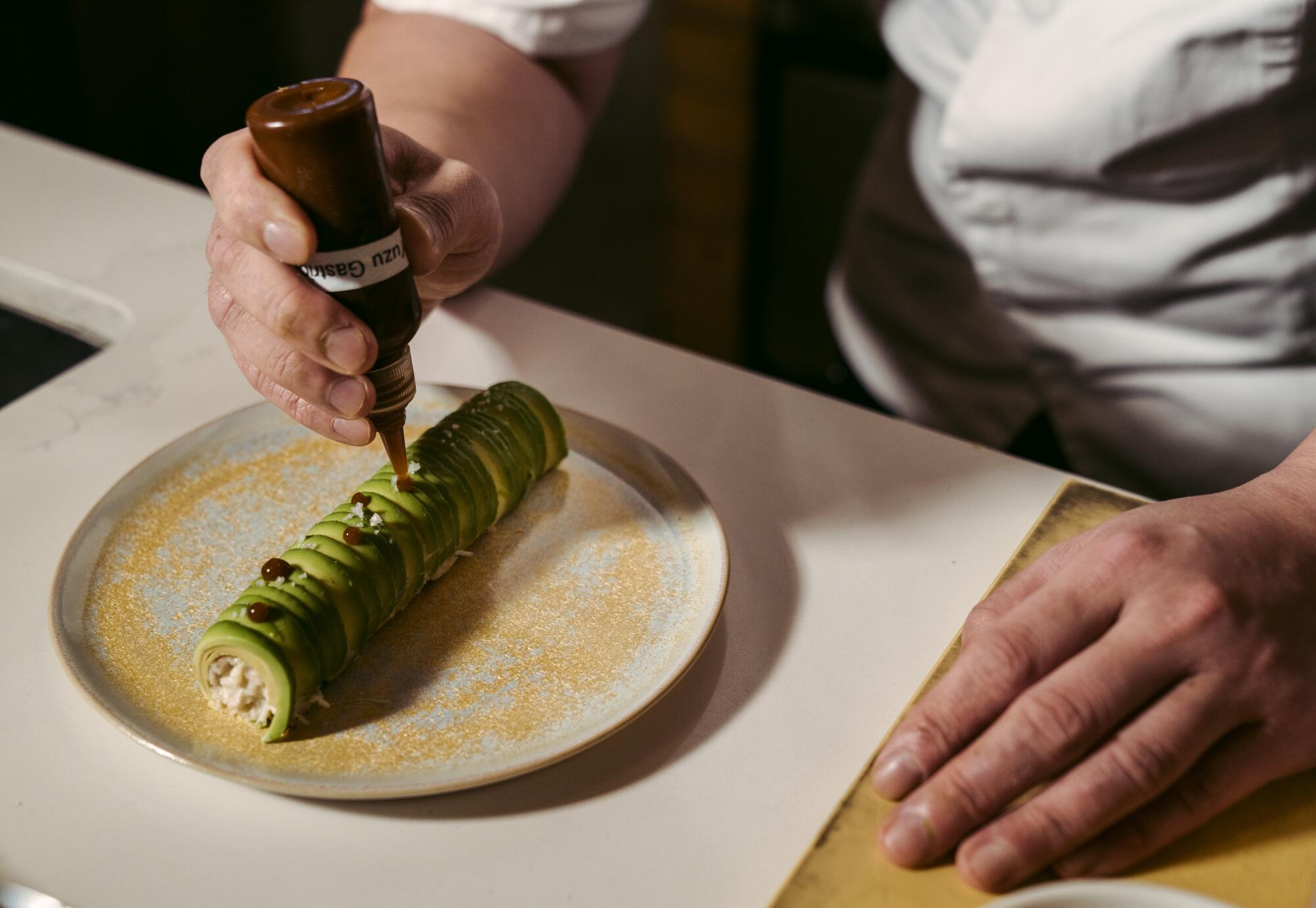
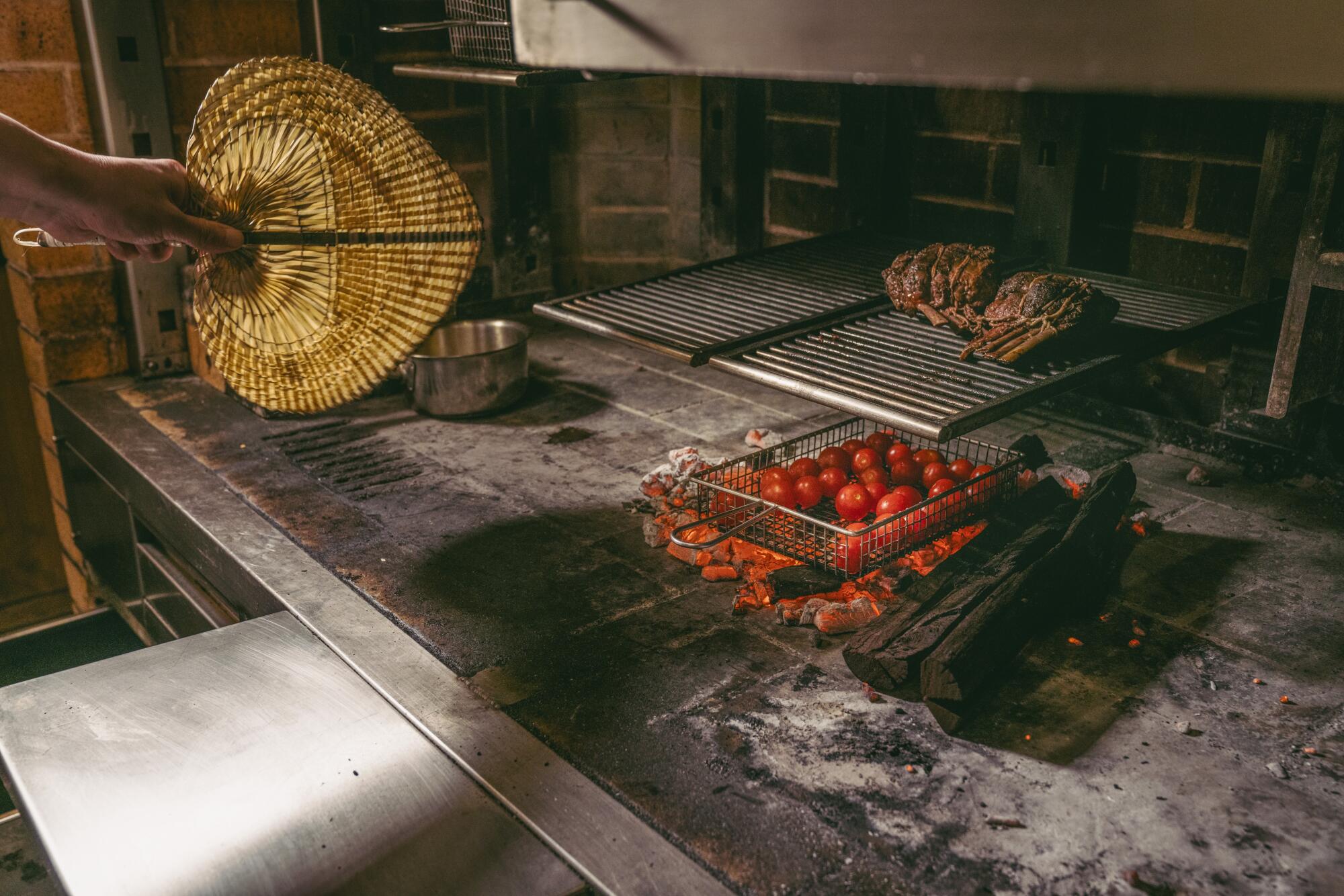
His life changed when he enrolled in the now closed Le Cordon Bleu culinary school in Pasadena. He thrived in the structured chaos of a working kitchen. His hands busy, his mind alert, Tang gained the trust of a classmate who found him catering gigs at entertainment industry parties. It was the start of a professional journey that would first take him to Melisse in Santa Monica in 2003 followed by a 12-year stint with Wolfgang Puck in Beverly Hills, New York and Dubai, where his stay was cut short after the company’s newly opened steakhouse was destroyed in a New Year’s Eve fire.
Tang admired Puck, who enjoyed off-color kitchen banter and had a habit of tasting his chefs’ cooking by jabbing a finger into the dishes they prepared. But Tang longed to work in Asia, which he understood only through an Asian American lens. He wanted to know what it would feel like not to be a minority, to never wonder if his ethnicity held him back from a promotion.
Tang’s temper occasionally got the better of him, he admits, but nothing separated him from the chefs picked to run restaurants ahead of him other than race, he reasoned. “I don’t know what I should think or believe or why I consistently had to be the second in command instead of the first,” Tang said.
At the same time, an up-and-coming Singaporean company behind a series of popular cocktail and oyster bars named Jigger & Pony was looking for a chef to helm a new modern American-Italian restaurant at a waterfront space with stellar views of Marina Bay Sands. Tang applied, moved to Singapore and opened Caffe Fernet in 2018.
Born in South Korea, Christian Morales was raised by a Mexican abuela in East L.A. At his Mexican restaurant in Seoul, he’s re-creating the flavors of the home he can’t return to since being deported 17 years ago.
That first year, Tang canvassed the city and ate everything he could. He traveled to the Malaysian street food mecca of Penang and marveled at the vendors firing their woks with charcoal.
“It felt like coming home,” the 39-year-old Tang said of Singapore. “It was like being in a big Monterey Park.”
But the pandemic hit the restaurant industry particularly hard. Singapore imposed lockdowns, banned indoor dining, limited group sizes to two and even forbade music in restaurants under the belief diners could spread the virus wider by having to speak louder.
Tang encountered another problem too: how his newly adopted Asia saw his native home. When Rosemead was proposed, Jigger & Pony’s PR consultants were skeptical, less because of COVID-19 than cultural perceptions: Singaporeans, they said, expect burgers and barbecue from their American restaurants and would struggle to understand California cuisine.
“I’ve heard it described as ‘spa food,’” said Tang, who speaks in a soft deadpan voice and wears a scowl refined over two decades in high pressure kitchens.
Others, without ever visiting Erewhon Market, have likened the cuisine to anything that involves avocado and quinoa. Some have called it an American version of Australian food.
“The struggle is real,” said Moon, 38, the general manager.
Like Goodman at the Dandy Collection, Tang has learned the challenge of promoting farm-to-table cuisine in Singapore. He had modest successes, like when he found a grower of leafy greens running an aquaponics farm in a high story industrial warehouse. Another farm in Cameron Highlands grew cherry tomatoes that were sweet as candy.
Other discoveries were more frustrating, such as the farmer who raised exceptionally fresh softshell crab, but insisted on selling them frozen because that’s all he’d ever done. A goat milk producer seemed promising until Tang discovered all the feed their animals consumed wasn’t remotely local but imported from California.
“It would be a lot easier to just say all our ingredients come from California rather than try and build an ecosystem of producers here,” said Kantono, Jigger & Pony’s 38-year-old co-founder. “I mean, all the French chefs and Japanese chefs are shouting at the top of their lungs that everything they serve is from France or Japan. But that’s not what David wants to do. That’s not the California way.”
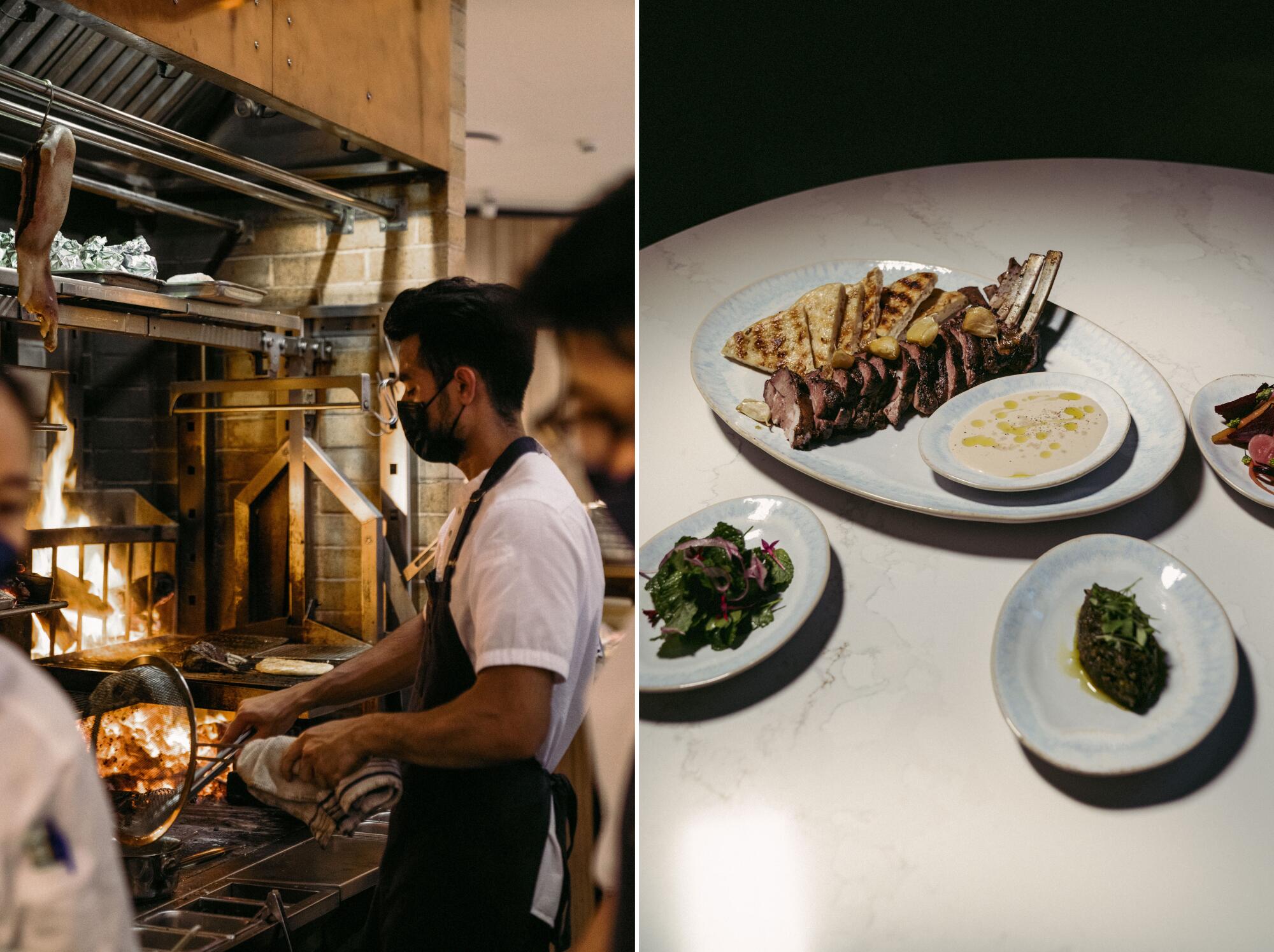
Rosemead opened on Christmas Day in a former colonial-era bank building with soaring tray ceilings in the heart of Singapore’s business district. The menu highlighted local producers like the aquaponic BlueAcres farm and the tomato supplier, Chitose Farm. It includes dishes like bitter greens and blood orange that burst with California sunshine, Tajima beef tongue cooked over orange and lychee wood, and a hulking Wagyu tomahawk steak from Australia’s southern Limestone Coast that will set you back $250.
Tang’s cooking has largely received glowing reviews, though complaints persist about the cost of a meal. Kantono says it’s necessary to pay for top ingredients, skilled service and the striking space.
News of the restaurant’s opening made it back to Rosemead City Hall, whose mayor pro tem Sean Dang emailed Tang thanking him for paying homage to his city in the “top mega foodie capital of the world — Singapore!”
Even Tang’s older sister, who shares the family’s aversion to sentimentality, was deeply moved by the name.
“It was where he was born and where we were raised,” said Karen Tsang, 45, who now lives in Glendora. “I would never tell him this because it’s too mushy, but the name is so thoughtful and so touching. We’re so proud of him.”
Tang says he wants to include more local ingredients Singaporeans take for granted onto his menu, things like Chinese greens and everyday fish like pomfret. There are many ways to stay true to California cuisine, he says, even in faraway places like Rosemead, Singapore.
More to Read
Global California Alert
Receive an alert every time there's a new story in The Times' Global California project, showcasing the connections between California and the world.
You may occasionally receive promotional content from the Los Angeles Times.
